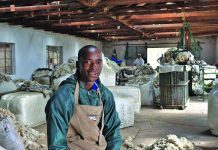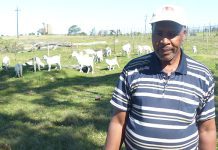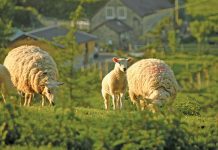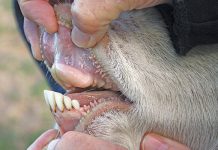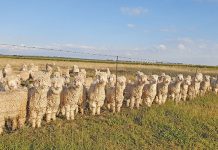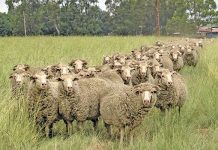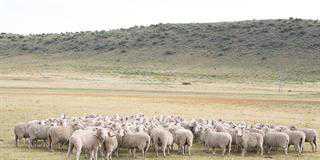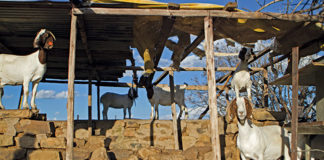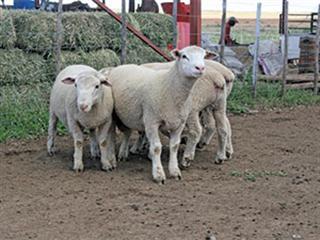
When Barnie Venter of the farm Helderhoek near Reddersburg asked renowned Merino stud breeder Eddie Prinsloo if he would be interested in leasing his farming operation, Eddie needed little persuasion. The Helderhoek Dormer Stud is one of the oldest Dormer stud flocks in South Africa and consists of 200 stud ewes, six stud rams, 1 600 flock ewes and 60 flock rams.
Although Eddie’s name has become a byword in Merino circles, he has had an interest in Dormers ever since studying at Elsenburg College in Stellenbosch in the seventies, where he was lectured by Leeb Ferreira, one of the founders of the Dormer breed. Here was the ideal opportunity to diversify – and use his considerable experience with Merinos, to get the best out of another breed. He took over Helderhoek in February last year. The lease included land, implements and livestock, which comprised all the Dormers, 50 Drakensberger cows and two bulls.
Merino foundation
It was perhaps inevitable that Eddie, who farms at Heuningkrans, Smithfield, would become a Merino breeder. His grandfather David Prinsloo started a Merino stud in 1927 and his father Hennie, former chairperson of the Wool Board, continued in his footsteps. Eddie joined his father in 1975 and they ran the stud together until 1985, when Eddie took over the operation. The family’s involvement in Merinos extends to Eddie’s wife Lizette, who is a granddaughter of Bobby Loots, a well-known Merino stud breeder from Graaff-Reinet.

Zandre Gibson, Helderhoek farm manager (left), and Merino stud breeder Eddie Prinsloo, who has diversified into Dormer breeding.
New directions
Helderhoek, which is only 25km from Heuningkrans, has 270ha of arable dryland, 10ha land under irrigation and 1 720ha veld. The farm lies about 1 500m above sea level. Summer temperatures can climb to 38°C while winter temperatures can drop to -12°C. The veld is dry Cymbopogon-Themeda and consists of sweet grasses and mixed Karoo shrub. Camps vary from 150ha to 200ha.
Local farmer Zandre Gibson manages the farm and handles the Dormer stud administration. He has 20 years of mixed farming experience on his own farm in the area. Eddie plants maize, oats and wheat as stock feed, hiring a contractor, Fanie Marais, to do this. The irrigated land, fed by boreholes, consists of 6ha of lucerne and 4ha of an annual green feed crop, either oats or wheat.
Eddie manages his veld according to a rotational grazing management plan. Veld camps are stocked at 1 sheep/ha. The rotation/rest cycle is about 60 days, depending on the condition of the sheep; this provides sufficient time for the vegetation to recover. Sheep condition is monitored by regular weighing.
The mountain camps are grazed in winter while the vlei areas are used during the summer months. In winter, the grass in the vlei areas is frosted off while that in higher lying areas stays green for longer because it is protected by large rocky outcrops and ravines. The mountain veld has a sweeter type of grass with a lower carrying capacity than grass in the low-lying areas.
Snow is not uncommon during the harsh winter months, but ravines in the mountain camps provide shelter for the sheep, helping them survive the cold without too much weight loss. Eddie’s aim with the Dormer is to breed hardy sheep with good conformation and muscling that can thrive and perform well on the veld of the southern Free State. He has been impressed by the breed’s performance so far.
Eddie breeds the Dormer primarily for meat; wool is a secondary product as this is a white wool mutton breed and the wool is not in the same class as that of the Merino. Yield, micron value or clean yield of wool are not considered primary selection criteria in breeding Dormers. The Dormer wool operation on Helderhoek is run independently from the Merino operation on Heuningkrans. Helderhoek Dormers are shorn in September and the wool is sold to BKB for about R20/kg, 75% less than Merino wool.

Helderhoek boreholes deliver good pressure.
Instead of using rams to mate the stud ewes, Eddie uses laparoscopic AI performed by his vet Dr Nolte Troskie of Bloemfontein. The flock ewes, mated naturally by flock rams, achieve a high conception rate, with many multiple births and a weaning rate of above 130%. Dormer ewes have two breeding seasons, lambing in April and September. The ewes are kept on green feed with their lambs for two weeks before being returned to the veld.
Wether lambs are weaned on the veld at three to four months at an average weight of approximately 35kg. They are then rounded off on feed cubes made on the farm and sold for slaughter at about 100 days, between 45kg and 50kg liveweight.
Stud ram lambs are also weaned at three to four months. They receive cubes until ready to be sold for breeding at between 12 and 14 months and a weight of 90kg to 120kg.
Because Dormer rams are selected primarily for meat, conformation of a stud ram is crucial. Key traits are hardiness and muscle development as well as the correct balance between length and depth of body.At Eddie’s first Dormer ram sale, the National Dormer Ram Sale in Bloemfontein in September 2012, one of his rams attained the third-highest price of the day, selling for R32 000 to Geoff Orpen of Barkly East.
Contact: Eddie Prinsloo on 083 279 2677.

